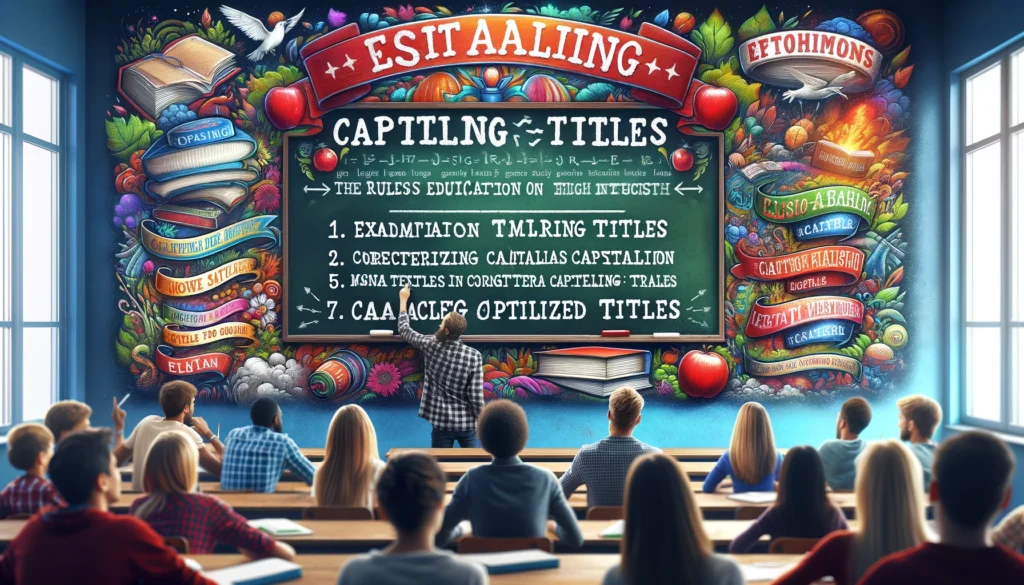Have you ever found yourself scratching your head, wondering how to capitalize titles correctly? It seems simple, right? But when you actually sit down to write that perfect headline or book title, doubts start creeping in. Is it “Of” or “of”? “And” or “and”?
Getting the capitalization right can make your work look polished and professional. Plus, it’s one of those little details that can really bug you if it’s not quite right.
Don’t worry, though; it’s not as complicated as it seems. Once you get the hang of a few basic rules, you’ll be capitalizing titles like a pro. And I’m here to walk you through it, step by step. So, let’s dive in and demystify this together, shall we?
How to Capitalize Titles

Capitalizing titles in English might seem tricky at first, but once you grasp the general rules, it becomes second nature.
The key points to remember include always capitalizing the first and last words of the title, no matter their part of speech. This ensures a neat and proper look right off the bat.
In between the first and last words, make sure to capitalize all the important words. This includes nouns, pronouns, verbs, adjectives, and adverbs. These words are the core of your title, carrying the weight of meaning and action.
On the flip side, smaller words such as conjunctions (like “and,” “but,” “or”), articles (“the,” “a,” “an”), and most prepositions (such as “in,” “on,” “by”) usually stay in lowercase, unless they’re part of a phrasal verb or are the first or last word in the title.
Remember, these guidelines serve as a foundation. The goal is to make your title stand out and be easily readable at a glance. By emphasizing the significant words through capitalization, you guide your reader’s attention to the essence of your work.
Understand the Major Style Guides
Now, it’s essential to recognize that different style guides have their own specific rules for title capitalization, depending on the needs of academic, professional, and creative writing.
- APA (American Psychological Association) style is widely used in the social sciences and emphasizes consistency and clarity in title capitalization.
- MLA (Modern Language Association) style is preferred in the humanities and offers guidelines that focus on the details of literary analysis and critique.
- Chicago style is versatile, catering to both publishers and authors with detailed rules that balance readability with formal precision.
- AP (Associated Press) style is the go-to for journalists, emphasizing brevity and clarity for quick comprehension.
Each guide outlines specific rules for handling those tricky smaller words, with variations on which should be capitalized based on length, position, or function in the title.
Capitalize Key Words

When it comes to capitalizing titles, the spotlight really shines on the key words. These are the words that grab your reader’s attention and give them a sneak peek into what your piece is all about.
So, which ones make the cut? Let’s break it down.
First off, always capitalize the main words, including nouns and pronouns. These are your subjects, the who or what of the story or article.
Verbs get the capital treatment too, since they’re the action stars of any sentence.
Adjectives and adverbs? Yep, they’re in as well. They add color and detail to your nouns and verbs, so they deserve a little uppercase love.
But it’s not just about the parts of speech. Titles, names, and specific places are a definite yes. If your title mentions the Empire State Building, Shakespeare, or the Battle of Gettysburg, those are non-negotiables for capital letters. They’re specific, they’re significant, and they need to stand out.
Remember, these keywords are your title’s way of making a first impression. By giving them the capitalization they deserve, you’re ensuring that your title isn’t just noticed, but remembered.
Which Words to Lowercase
Now, just as important as knowing which words to capitalize in titles is understanding which ones usually stay in lowercase. It’s like the other side of the coin, helping to balance out your title and keep it looking neat.
So, which words are we talking about? Generally, the small connectors and fillers in your title don’t get the big letter treatment. This includes articles like “a,” “an,” and “the,” unless, of course, “the” is the first word in your title. Then, it gets capitalized.
Conjunctions such as “and,” “but,” and “or” also stay lowercase. These words are essential for linking your ideas, but they don’t need the emphasis that capitalization brings.
The same goes for most prepositions, like “in,” “on,” “under,” and “over.” These words help to show the relationship between other words in the title, but they’re not the main attraction.
The idea here is to keep the focus on the key elements of your title—the nouns, pronouns, verbs, adjectives, and adverbs that really tell the reader what your piece is about. By keeping these smaller, less significant words in lowercase, you help ensure that the important words stand out more. It’s all about making your title as clear and reader-friendly as possible.
Use Tools for Title Capitalization

If you’re like me and sometimes second-guess every capital letter in your titles, you’ll be glad to know there are some fantastic tools out there designed to take the guesswork out of the process.
For starters, websites like Capitalize My Title or Title Case Converter come in handy. You simply type in your title, select the style guide you’re following (like APA, MLA, Chicago, or AP), and voila! The tool adjusts your title to fit the correct capitalization rules.
Another great thing about these tools is that they’re not just for titles. Some can help with headings, subheadings, and even your entire document, ensuring consistency throughout your work.
Plus, they often offer explanations for why certain words are capitalized or not, which is a fantastic way to learn and get better at doing it yourself.
AI Automateed for Writing Titles
And if you want to make this process even simpler, there is AI Automateed that can help you with even more of the title hustle.
This tool can help you create the perfect title for your book, capitalized as should be.
So if you are unsure of what words to capitalize, but also not 100% set on the title of your book, do check out AI Automateed.
Here is a quick preview video of how it is done:
Besides, AI Automated is so much more. This smart tool can write whole books for you in literally minutes.
Ideally, you would enter your title, target audience and tone in which you want your book to be written, and the tool will then generate the outline, and then write the whole 90-page book for you. 100% unique, original and yours.
However, you don’t even have to know all of that, as the tool comes with separate tasks to help you brainstorm niches, subniches, titles, figure out your target audience’s pain points, etc.
And the best part is that you can try it out for free before you decide on the subscription.
Conclusion
Mastering how to capitalize titles is a key skill that can significantly impact the professionalism and appeal of your writing. By understanding which words to highlight and which to keep in lowercase, you ensure that your titles grab attention for all the right reasons.
Remember, the goal is clarity and impact. Whether you’re writing an article, a book, or any piece of content, knowing how to capitalize titles correctly helps set the tone for your readers. And with the help of online tools, this task has never been easier. So, take these tips, apply them to your work, and watch how a well-capitalized title can make a big difference.
FAQ
Which words do you not capitalize in a title?
In a title, do not capitalize small conjunctions, articles, and prepositions, such as “and,” “but,” “or,” “the,” “a,” “an,” “in,” “on,” unless they start or end the title.
How do you capitalize a title correctly?
To capitalize a title correctly, always capitalize the first and last words, along with all nouns, pronouns, verbs, adjectives, and adverbs. Keep smaller words like articles, prepositions, and conjunctions in lowercase, unless they begin or end the title.
Which words are typically not capitalized in titles?
Words typically not capitalized in titles include articles (a, an, the), conjunctions (and, but, for), and prepositions (in, on, at, to), unless they are the first or last word of the title.
Should titles always be Capitalised?
Titles should always be capitalized according to standard capitalization rules, which include capitalizing the first and last word, as well as all key words in between. However, minor words like prepositions and conjunctions should usually remain in lowercase, unless they start or end the title.
